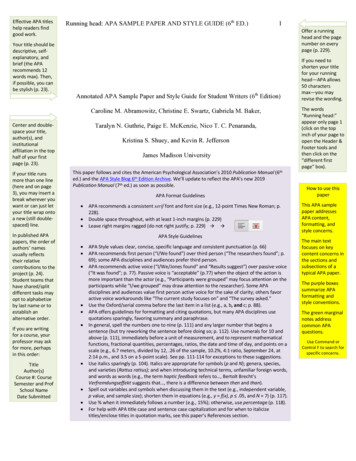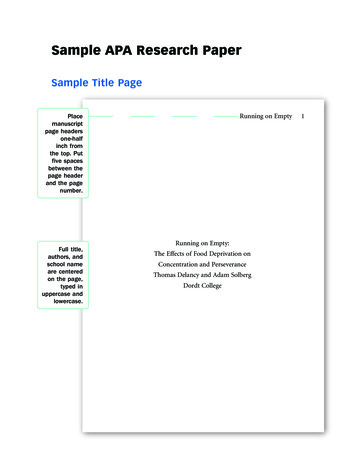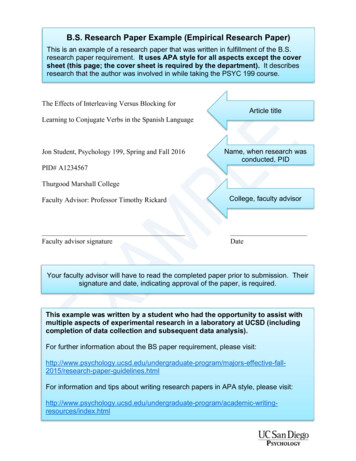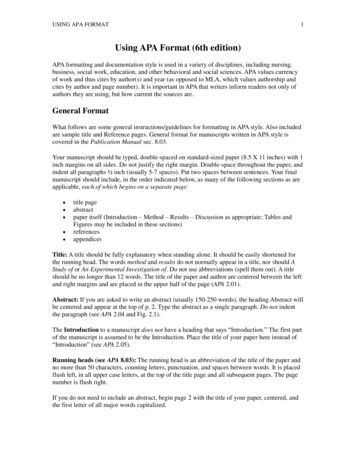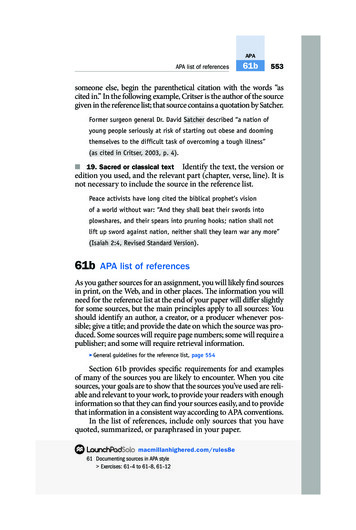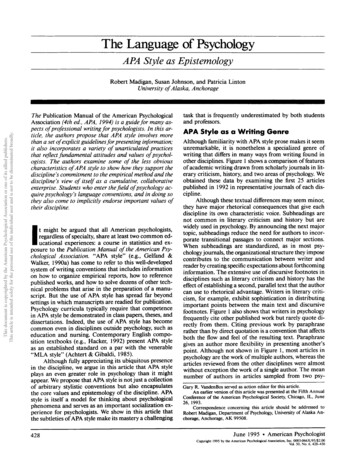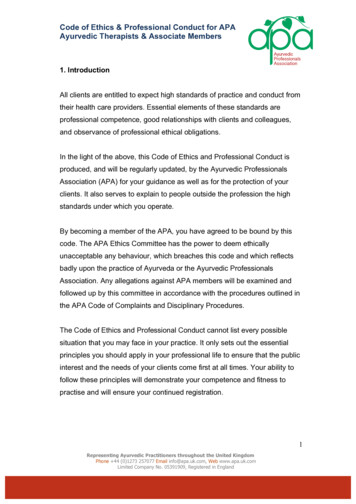
Transcription
Sample APA Research PaperSample Title PageRunning on EmptyPlacemanuscriptpage headersone-halfinch fromthe top. Putfive spacesbetween thepage headerand the pagenumber.Full title,authors, andschool nameare centeredon the page,typed inuppercase andlowercase.Running on Empty:The Effects of Food Deprivation onConcentration and PerseveranceThomas Delancy and Adam SolbergDordt College1
34Sample AbstractRunning on Empty2AbstractThis study examined the effects of short-term food deprivation on twoThe abstractsummarizesthe s, andconclusions.cognitive abilities—concentration and perseverance. Undergraduatestudents (N-51) were tested on both a concentration task and aperseverance task after one of three levels of food deprivation: none, 12hours, or 24 hours. We predicted that food deprivation would impair bothconcentration scores and perseverance time. Food deprivation had nosignificant effect on concentration scores, which is consistent with recentresearch on the effects of food deprivation (Green et al., 1995; Greenet al., 1997). However, participants in the 12-hour deprivation groupspent significantly less time on the perseverance task than those in boththe control and 24-hour deprivation groups, suggesting that short-termdeprivation may affect some aspects of cognition and not others.
An APA Research Paper ModelThomas Delancy and Adam Solberg wrote the following research paper fora psychology class. As you review their paper, read the side notes and examine thefollowing: The use and documentation of their numerous sources. The background they provide before getting into their own study results. The scientific language used when reporting their results.Center thetitle one inchfrom the top.Double-spacethroughout.Running on Empty3Running on Empty: The Effects of Food Deprivationon Concentration and PerseveranceMany things interrupt people’s ability to focus on a task: distractions,headaches, noisy environments, and even psychological disorders. ToTheintroductionstates thetopic andthe mainquestions tobe explored.some extent, people can control the environmental factors that make itdifficult to focus. However, what about internal factors, such as an emptystomach? Can people increase their ability to focus simply by eatingregularly?One theory that prompted research on how food intake affects theaverage person was the glucostatic theory. Several researchers in theTheresearcherssupplybackgroundinformationby discussingpast researchon the topic.1940s and 1950s suggested that the brain regulates food intake in orderto maintain a blood-glucose set point. The idea was that people becomehungry when their blood-glucose levels drop significantly below their setpoint and that they become satisfied after eating, when their blood-glucoselevels return to that set point. This theory seemed logical because glucoseis the brain’s primary fuel (Pinel, 2000). The earliest investigation of thegeneral effects of food deprivation found that long-term food deprivation(36 hours and longer) was associated with sluggishness, depression,irritability, reduced heart rate, and inability to concentrate (Keys, Brozek,Extensivereferencingestablishessupportfor thediscussion.Henschel, Mickelsen, & Taylor, 1950). Another study found that fastingfor several days produced muscular weakness, irritability, and apathy ordepression (Kollar, Slater, Palmer, Docter, & Mandell, 1964). Since that time,research has focused mainly on how nutrition affects cognition. However, asGreen, Elliman, and Rogers (1995) point out, the effects of food deprivationon cognition have received comparatively less attention in recent years.
Running on Empty4The relatively sparse research on food deprivation has left room forfurther research. First, much of the research has focused either on chronicTheresearchersexplain howtheir studywill add topast researchon the topic.starvation at one end of the continuum or on missing a single meal at theother end (Green et al., 1995). Second, some of the findings have beencontradictory. One study found that skipping breakfast impairs certainaspects of cognition, such as problem-solving abilities (Pollitt, Lewis,Garza, & Shulman, 1983). However, other research by M. W. Green, N.A. Elliman, and P. J. Rogers (1995, 1997) has found that food deprivationranging from missing a single meal to 24 hours without eating does notsignificantly impair cognition. Third, not all groups of people have beensufficiently studied. Studies have been done on 9–11 year-olds (Pollitt etCleartransitionsguide readersthrough theresearchers’reasoning.al., 1983), obese subjects (Crumpton, Wine, & Drenick, 1966), college-agemen and women (Green et al., 1995, 1996, 1997), and middle-age males(Kollar et al., 1964). Fourth, not all cognitive aspects have been studied.In 1995 Green, Elliman, and Rogers studied sustained attention, simplereaction time, and immediate memory; in 1996 they studied attentionalbias; and in 1997 they studied simple reaction time, two-finger tapping,recognition memory, and free recall. In 1983, another study focused onreaction time and accuracy, intelligence quotient, and problem solving(Pollitt et al.).According to some researchers, most of the results so far indicate thatcognitive function is not affected significantly by short-term fasting (Greenet al., 1995, p. 246). However, this conclusion seems premature due to therelative lack of research on cognitive functions such as concentration andTheresearcherssupport theirdecision tofocus onconcentrationandperseverance.perseverance. To date, no study has tested perseverance, despite itsimportance in cognitive functioning. In fact, perseverance may be a betterindicator than achievement tests in assessing growth in learning andthinking abilities, as perseverance helps in solving complex problems(Costa, 1984). Another study also recognized that perseverance, betterlearning techniques, and effort are cognitions worth studying (D’Agostino,1996). Testing as many aspects of cognition as possible is key because thenature of the task is important when interpreting the link between fooddeprivation and cognitive performance (Smith & Kendrick, 1992).
Running on EmptyTheresearchersstate theirinitialhypotheses.5Therefore, the current study helps us understand how short-term fooddeprivation affects concentration on and perseverance with a difficult task.Specifically, participants deprived of food for 24 hours were expected toperform worse on a concentration test and a perseverance task than thosedeprived for 12 hours, who in turn were predicted to perform worse thanthose who were not deprived of food.MethodHeadings andsubheadingsshow thepaper’sorganization.ParticipantsParticipants included 51 undergraduate-student volunteers (32females, 19 males), some of whom received a small amount of extra creditin a college course. The mean college grade point average (GPA) was 3.19.Potential participants were excluded if they were dieting, menstruating,or taking special medication. Those who were struggling with or hadTheexperiment’smethod isdescribed,using theterms andacronyms ofthe discipline.struggled with an eating disorder were excluded, as were potentialparticipants addicted to nicotine or caffeine.MaterialsConcentration speed and accuracy were measured using an onlinenumbers-matching test at consisted of 26 lines of 25 numbers each. In 6 minutes, participantswere required to find pairs of numbers in each line that added up to 10.Scores were calculated as the percentage of correctly identified pairs out ofPassive voiceis used toemphasizetheexperiment,not theresearchers;otherwise,active voiceis used.a possible 120. Perseverance was measured with a puzzle that containedfive octagons—each of which included a stencil of a specific object (suchas an animal or a flower). The octagons were to be placed on top ofeach other in a specific way to make the silhouette of a rabbit. However,three of the shapes were slightly altered so that the task was impossible.Perseverance scores were calculated as the number of minutes that aparticipant spent on the puzzle task before giving up.ProcedureAt an initial meeting, participants gave informed consent. Eachconsent form contained an assigned identification number and requestedthe participant’s GPA. Students were then informed that they would benotified by e-mail and telephone about their assignment to one of the
Running on Empty6three experimental groups. Next, students were given an instructionTheexperiment islaid out stepby step,with timetransitionslike “then”and “next.”sheet. These written instructions, which we also read aloud, explainedthe experimental conditions, clarified guidelines for the food deprivationperiod, and specified the time and location of testing.Participants were randomly assigned to one of these conditionsusing a matched-triplets design based on the GPAs collected at theinitial meeting. This design was used to control individual differencesin cognitive ability. Two days after the initial meeting, participants wereinformed of their group assignment and its condition and reminded that,if they were in a food-deprived group, they should not eat anything after10 a.m. the next day. Participants from the control group were tested at7:30 p.m. in a designated computer lab on the day the deprivation started.Those in the 12-hour group were tested at 10 p.m. on that same day.Those in the 24-hour group were tested at 10:40 a.m. on the following day.At their assigned time, participants arrived at a computer labfor testing. Each participant was given written testing instructions,which were also read aloud. The online concentration test had alreadyAttention isshown tothe controlfeatures.been loaded on the computers for participants before they arrived fortesting, so shortly after they arrived they proceeded to complete thetest. Immediately after all participants had completed the test and theirscores were recorded, participants were each given the silhouette puzzleand instructed how to proceed. In addition, they were told that (1) theywould have an unlimited amount of time to complete the task, and (2)they were not to tell any other participant whether they had completedthe puzzle or simply given up. This procedure was followed to preventthe group influence of some participants seeing others give up. Anyparticipant still working on the puzzle after 40 minutes was stopped tokeep the time of the study manageable. Immediately after each participantstopped working on the puzzle, he/she gave demographic informationand completed a few manipulation-check items. We then debriefed anddismissed each participant outside of the lab.
Running on Empty7ResultsThe writerssummarizetheir findings,includingproblemsencountered.Perseverance data from one control-group participant wereeliminated because she had to leave the session early. Concentration datafrom another control-group participant were dropped because he did notcomplete the test correctly. Three manipulation-check questions indicatedthat each participant correctly perceived his or her deprivation conditionand had followed the rules for it. The average concentration score was77.78 (SD 14.21), which was very good considering that anything over50 percent is labeled “good” or “above average.” The average time spenton the puzzle was 24.00 minutes (SD 10.16), with a maximum of 40All figuresandillustrations(other thantables) arenumberedin the orderthat theyare firstmentioned inthe text.minutes allowed.We predicted that participants in the 24-hour deprivation groupwould perform worse on the concentration test and the perseverance taskthan those in the 12-hour group, who in turn would perform worse thanthose in the control group. A one-way analysis of variance (ANOVA)showed no significant effect of deprivation condition on concentration,F(2,46) 1.06, p .36 (see Figure 1). Another one-way ANOVA indicatedFigure 1.100Mean score on concentration test“See Figure1” sendsreaders to afigure (graph,photograph,chart, ordrawing)contained inthe paper.9080706050No deprivation12-hour deprivationDeprivation Condition24-hour deprivation
Running on EmptyTheresearchersrestate theirhypothesesand theresults, andgo on tointerpretthose results.8a significant effect of deprivation condition on perseverance time,F(2,47) 7.41, p .05. Post-hoc Tukey tests indicated that the 12-hourdeprivation group (M 17.79, SD 7.84) spent significantly less timeon the perseverance task than either the control group (M 26.80, SD 6.20) or the 24-hour group (M 28.75, SD 12.11), with no significantdifference between the latter two groups (see Figure 2). No significanteffect was found for gender either generally or with specific deprivationconditions, Fs 1.00. Unexpectedly, food deprivation had no significanteffect on concentration scores. Overall, we found support for ourhypothesis that 12 hours of food deprivation would significantly impairperseverance when compared to no deprivation. Unexpectedly, 24 hoursof food deprivation did not significantly affect perseverance relative to thecontrol group. Also unexpectedly, food deprivation did not significantlyaffect concentration scores.Mean score on perseverance testFigure 2.302826242220181614121086420No deprivation12-hour deprivation24-hour deprivationDeprivation ConditionDiscussionThe purpose of this study was to test how different levels of fooddeprivation affect concentration on and perseverance with difficult tasks.
Running on Empty9We predicted that the longer people had been deprived of food, the lowerthey would score on the concentration task, and the less time they wouldspend on the perseverance task. In this study, those deprived of food didgive up more quickly on the puzzle, but only in the 12-hour group. Thus,the hypothesis was partially supported for the perseverance task. However,concentration was found to be unaffected by food deprivation, and thusthe hypothesis was not supported for that task.The findings of this study are consistent with those of Green et al.The writersspeculateon possibleexplanationsfor theunexpectedresults.(1995), where short-term food deprivation did not affect some aspectsof cognition, including attentional focus. Taken together, these findingssuggest that concentration is not significantly impaired by short-termfood deprivation. The findings on perseverance, however, are not as easilyexplained. We surmise that the participants in the 12-hour group gave upmore quickly on the perseverance task because of their hunger producedby the food deprivation. But why, then, did those in the 24-hour groupfail to yield the same effect? We postulate that this result can be explainedby the concept of “learned industriousness,” wherein participants whoperform one difficult task do better on a subsequent task than theparticipants who never took the initial task (Eisenberger & Leonard,1980; Hickman, Stromme, & Lippman, 1998). Because participantshad successfully completed 24 hours of fasting already, their tendencyto persevere had already been increased, if only temporarily. Anotherpossible explanation is that the motivational state of a participant may bea significant determinant of behavior under testing (Saugstad, 1967). Thisidea may also explain the short perseverance times in the 12-hour group:because these participants took the tests at 10 p.m., a prime time of thenight for conducting business and socializing on a college campus, theymay have been less motivated to take the time to work on the puzzle.Research on food deprivation and cognition could continue in severaldirections. First, other aspects of cognition may be affected by short-termfood deprivation, such as reading comprehension or motivation. Withrespect to this latter topic, some students in this study reported decreasedmotivation to complete the tasks because of a desire to eat immediately
Running on Empty10after the testing. In addition, the time of day when the respective groupstook the tests may have influenced the results: those in the 24-hourgroup took the tests in the morning and may have been fresher and morerelaxed than those in the 12-hour group, who took the tests at night.Perhaps, then, the motivation level of food-deprived participants couldbe effectively tested. Second, longer-term food deprivation periods, suchas those experienced by people fasting for religious reasons, could beexplored. It is possible that cognitive function fluctuates over the durationof deprivation. Studies could ask how long a person can remain focuseddespite a lack of nutrition. Third, and perhaps most fascinating, studiescould explore how food deprivation affects learned industriousness. Asstated above, one possible explanation for the better perseverance timesin the 24-hour group could be that they spontaneously improved theirperseverance faculties by simply forcing themselves not to eat for 24hours. Therefore, research could study how food deprivation affects theacquisition of perseverance.In conclusion, the results of this study provide some sses theexperiment’svalue, andanticipatesfurtheradvances onthe topic.insights into the cognitive and physiological effects of skipping meals.Contrary to what we predicted, a person may indeed be very capable ofconcentrating after not eating for many hours. On the other hand, if oneis taking a long test or working long hours at a tedious task that requiresperseverance, one may be hindered by not eating for a short time, asshown by the 12-hour group’s performance on the perseverance task.Many people—students, working mothers, and those interested in fasting,to mention a few—have to deal with short-term food deprivation,intentional or unintentional. This research and other research to followwill contribute to knowledge of the disadvantages—and possibleadvantages—of skipping meals. The mixed results of this study suggestthat we have much more to learn about short-term food deprivation.
Running on Empty11ReferencesAll worksreferred toin the paperappear onthe referencepage, listedalphabeticallyby author(or title).Costa, A. L. (1984). Thinking: How do we know students are getting betterat it? Roeper Review, 6, 197–199.Crumpton, E., Wine, D. B., & Drenick, E. J. (1966). Starvation: Stressor satisfaction? Journal of the American Medical Association, 196,394–396.D’Agostino, C. A. F. (1996). Testing a social-cognitive model ofachievement motivation.-Dissertation Abstracts International SectionA: Humanities & Social Sciences, 57, 1985.Eisenberger, R., & Leonard, J. M. (1980). Effects of conceptual taskEach entryfollows APAguidelinesfor listingauthors,dates,titles, andpublishinginformation.difficulty on generalized persistence. American Journal of Psychology,93, 285–298.Green, M. W., Elliman, N. A., & Rogers, P. J. (1995). Lack of effect ofshort-term fasting on cognitive function. Journal of PsychiatricResearch, 29, 245–253.Green, M. W., Elliman, N. A., & Rogers, P. J. (1996). Hunger, caloricpreloading, and the selective processing of food and body shapewords. British Journal of Clinical Psychology, 35, 143–151.Green, M. W., Elliman, N. A., & Rogers, P. J. (1997). The study effects offood deprivation and incentive motivation on blood glucose levelsand cognitive function. Psychopharmacology, 134, 88–94.Hickman, K. L., Stromme, C., & Lippman, L. G. (1998). LearnedCapitalization,punctuation,and hangingindentationare consistentwith APAformat.industriousness: Replication in principle. Journal of GeneralPsychology, 125, 213–217.Keys, A., Brozek, J., Henschel, A., Mickelsen, O., & Taylor, H. L. (1950).The biology of human starvation (Vol. 2). Minneapolis: University ofMinnesota Press.Kollar, E. J., Slater, G. R., Palmer, J. O., Docter, R. F., & Mandell, A. J.(1964). Measurement of stress in fasting man. Archives of GeneralPsychology, 11, 113–125.Pinel, J. P. (2000). Biopsychology (4th ed.). Boston: Allyn and Bacon.
Running on Empty12Pollitt, E., Lewis, N. L., Garza, C., & Shulman, R. J. (1982–1983). Fastingand cognitive function. Journal of Psychiatric Research, 17, 169–174.Saugstad, P. (1967). Effect of food deprivation on perception-cognition:A comment [Comment on the article by David L. Wolitzky].Psychological Bulletin, 68, 345–346.Smith, A. P., & Kendrick, A. M. (1992). Meals and performance. In A. P.Smith & D. M. Jones (Eds.), Handbook of human performance: Vol. 2,Health and performance (pp. 1–23). San Diego: Academic Press.Smith, A. P., Kendrick, A. M., & Maben, A. L. (1992). Effects of breakfastand caffeine on performance and mood in the late morning andafter lunch. Neuropsychobiology, 26, 198–204.
would perform worse on the concentration test and the perseverance task than those in the 12-hour group, who in turn would perform worse than those in the control group. A one-way analysis of variance (ANOVA) showed no significant effect of deprivation condition on concentration, F(2,46) 1.06, p .36 (see Figure 1).


